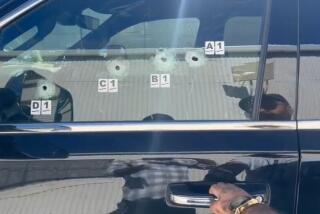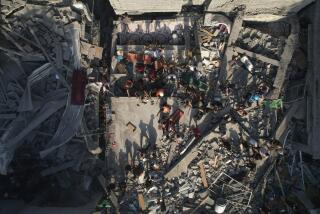After Slayings, Americans in Karachi Weigh Choices
- Share via
KARACHI, Pakistan — One American here is taking the next flight out. Another moved out of his house to a safer hotel. Another, who wants to stay, changed the route he drives to the office.
At the American Club, the center of social life for the 2,400 U.S. expatriates living in Karachi, a paper sign tacked to the door summed up the mood:
“Closed until further notice.”
A day after four Americans were slain here, the once-lively American community has closed itself off from its adopted home.
Some Americans said the shooting attack has prompted them to question whether the price of living in a turbulent country like Pakistan outweighs the benefits. The apparent failure of the Pakistani police to make much progress in apprehending the killers heightened the uneasy feeling among many that they had become targets.
“I would probably stay, but I’ve got a wife and three kids,” said Bill Keysock, a temporary technician at a nearby power plant who now expects to leave the country as soon as possible--and weeks ahead of schedule. “If I get blown up, my kids won’t be going to college.”
The grim mood among many Americans on Thursday followed the horrific slaying of the four American oil workers and their Pakistani driver. The five were shot at close range as they sat in their car by a team of gunmen on a crowded street.
A group calling itself the Aimal Secret Committee on Thursday claimed responsibility for the attack in a letter published in Jang, Pakistan’s most widely read Urdu-language newspaper.
The name of the group may refer to Mir Aimal Kasi, the Pakistani convicted Monday in a Virginia court of murdering two CIA employees outside the agency’s headquarters in 1993.
U.S. officials said they had never heard of the group and aren’t sure it really exists. U.S. officials have contended that Kasi acted alone and was unaffiliated with any terrorist organizations.
The committee’s letter warned that it would kill more Americans in Pakistan if Kasi is sentenced to death.
“If Aimal Kasi is martyred then we will not spare any American Jews on Pakistani soil and we will destroy the American Embassy in Pakistan,” declared the letter, signed Ajab Gul.
The letter also warned that, if Kasi remains imprisoned, “Clinton will die.” The White House has said visits to Pakistan by President Clinton early next year and Secretary of State Madeleine Albright on Sunday will proceed.
The FBI has dispatched a team to Karachi, and the CIA also is providing assistance to the Pakistani government, officials in Washington said.
State Department spokesman James P. Rubin reiterated his warning to American citizens about traveling to the region.
“Karachi, Pakistan, is not a safe place,” Rubin said.
In downtown Karachi and the quiet neighborhoods where Americans live, meanwhile, signs abounded Thursday that the atmosphere had dramatically changed.
People retreated to their homes and stayed indoors. U.S.-based multinational corporations hired more security guards. The city’s better hotels set up metal detectors and offered armed escorts for American guests.
At the Marriott Hotel, five Westerners checked out and said they were leaving the country, citing safety fears.
“Most people are still in shock,” said Vickey Wathtel, who manages the American Club.
The American school in Karachi, which sent students home after Wednesday’s shooting, remained closed while U.S. officials considered evacuating American children.
Nils Larsen, an officer with the World Bank, said he’s staying in Karachi. But he changed the route he took to work Thursday, in case someone might be following him.
“I’m trying to keep a low profile,” Larsen said.
The fear of another terrorist attack affected other Westerners living in the city.
“It’s not just Americans,” said Don Lucas, an electrical technician from Edmonton, Canada. “It’s anybody who’s white.”
Liquat Ali Jatoi, the chief minister of Sindh province, acknowledged that Americans do not feel safe in Karachi and have little confidence in his government’s ability to protect them.
“Other countries have terrorists, but people are not leaving those countries,” he said. “We have to stop the terrorists.”
American and Pakistani businesspeople worried that the targeting of Westerners by terrorist groups could scare away many potential investors.
“This is the last thing this country needs,” said Nisar Memon, general manager for IBM Corp. in Pakistan. “Whenever we have had an incident like this, investment dries up.”
Meanwhile, the bodies of the four slain Americans remained in Pakistan while officials with the company they worked for, Union Texas Petroleum Holdings Inc., prepared to send them home.
Shazia Sheikh, manager of the Pearl-Continental Hotel, had the grim task of sealing the rooms of three of the men, who had stayed there. Sheikh said she chatted with one of the men, Tracy Ritchie, the night before he died.
“He was telling me how he missed his wife,” she said.
*
Times staff writer Robert L. Jackson in Washington and special correspondents Zahid Hussain and Ghulam Hasnain in Karachi also contributed to this report.
More to Read
Sign up for Essential California
The most important California stories and recommendations in your inbox every morning.
You may occasionally receive promotional content from the Los Angeles Times.













